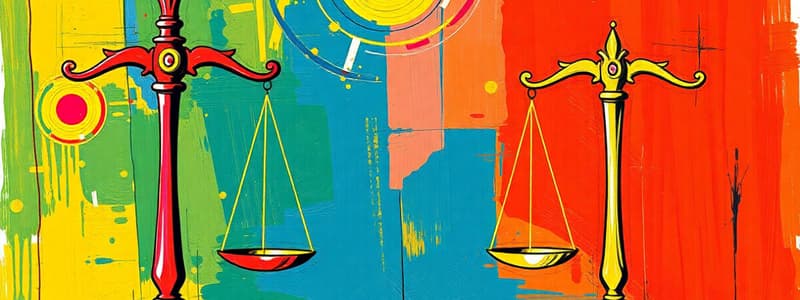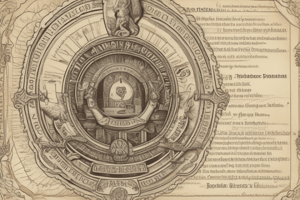Podcast
Questions and Answers
Which of the following is the most accurate definition of 'law' in its broadest sense?
Which of the following is the most accurate definition of 'law' in its broadest sense?
- A system of regulations enforced by a governing authority.
- The set of moral principles governing the conduct of individuals.
- Legislation enacted by a recognized authority.
- Any rule of action or system of uniformity guiding behavior or actions. (correct)
When does physical law, as distinct from state, divine, or natural law, apply to individuals?
When does physical law, as distinct from state, divine, or natural law, apply to individuals?
- Only when individuals consciously adhere to scientific principles.
- Only when individuals willingly submit to the dictates of nature.
- Only to those aspects of human life directly governed by state regulations.
- To all things, including people, irrespective of their personal choices or awareness. (correct)
Which of the following distinguishes natural law from divine law, according to the provided text?
Which of the following distinguishes natural law from divine law, according to the provided text?
- Natural law is based on internal dictates of reason, while divine law is revealed by God. (correct)
- Natural law is derived from direct divine revelation, while divine law is based on reason.
- Natural law concerns itself with sin and salvation, while divine law focuses on justice.
- Natural law applies only to believers, while divine law applies to all individuals.
What is the primary basis for moral law, as presented in the text?
What is the primary basis for moral law, as presented in the text?
How does the influence of moral law on state law manifest, based on the text?
How does the influence of moral law on state law manifest, based on the text?
What is the essential characteristic of state law that distinguishes it from other forms of law?
What is the essential characteristic of state law that distinguishes it from other forms of law?
How does the text define the 'general sense' of state law?
How does the text define the 'general sense' of state law?
Which statement accurately reflects the relationship between law and societal stability, according to the text?
Which statement accurately reflects the relationship between law and societal stability, according to the text?
What is the role of judicial decisions in the Philippine legal system?
What is the role of judicial decisions in the Philippine legal system?
What condition must administrative or executive orders, regulations, and rulings satisfy to be considered valid?
What condition must administrative or executive orders, regulations, and rulings satisfy to be considered valid?
Which of the following best describes the role of 'other sources' of law, such as principles of justice and equity, in the Philippine legal system?
Which of the following best describes the role of 'other sources' of law, such as principles of justice and equity, in the Philippine legal system?
How are the functions of quasi-judicial agencies best characterized?
How are the functions of quasi-judicial agencies best characterized?
What distinguishes substantive law from adjective law?
What distinguishes substantive law from adjective law?
How is private law distinguished from public law?
How is private law distinguished from public law?
In the context of obligations, what is meant by 'juridical necessity'?
In the context of obligations, what is meant by 'juridical necessity'?
Which of the following correctly identifies the essential requisites of an obligation?
Which of the following correctly identifies the essential requisites of an obligation?
What distinguishes a 'right' from an 'obligation' and a 'wrong' in law?
What distinguishes a 'right' from an 'obligation' and a 'wrong' in law?
What is the key characteristic of a 'real obligation'?
What is the key characteristic of a 'real obligation'?
Under what circumstance is an obligation considered a 'legal obligation'?
Under what circumstance is an obligation considered a 'legal obligation'?
When are contractual obligations presumed to be valid and enforceable?
When are contractual obligations presumed to be valid and enforceable?
What is the underlying principle behind quasi-contracts?
What is the underlying principle behind quasi-contracts?
What is 'negotiorum gestio'?
What is 'negotiorum gestio'?
What are the key requisites for 'solutio indebiti' to exist?
What are the key requisites for 'solutio indebiti' to exist?
When do obligations arise from crimes or acts or omissions punished by law?
When do obligations arise from crimes or acts or omissions punished by law?
What does civil liability for damages arising from crimes include?
What does civil liability for damages arising from crimes include?
What are the essential characteristics of a quasi-delict?
What are the essential characteristics of a quasi-delict?
Which elements must be present before a person can be held liable for a quasi-delict?
Which elements must be present before a person can be held liable for a quasi-delict?
How do obligations arising from quasi-contracts, delicts, and quasi-delicts relate to the law?
How do obligations arising from quasi-contracts, delicts, and quasi-delicts relate to the law?
What distinguishes the Court of Appeals and Regional Trial Courts from Metropolitan Trial Courts and Municipal Circuit Trial Courts in terms of jurisdiction?
What distinguishes the Court of Appeals and Regional Trial Courts from Metropolitan Trial Courts and Municipal Circuit Trial Courts in terms of jurisdiction?
How do Special Courts, such as the Sandiganbayan and the Court of Tax Appeals, fit into the Philippine judicial hierarchy?
How do Special Courts, such as the Sandiganbayan and the Court of Tax Appeals, fit into the Philippine judicial hierarchy?
How do independent Constitutional Commissions relate to the integrated judicial system of the Philippines?
How do independent Constitutional Commissions relate to the integrated judicial system of the Philippines?
Considering the definition of state law, which example best illustrates a law in its 'specific sense'?
Considering the definition of state law, which example best illustrates a law in its 'specific sense'?
Why are legal obligations not presumed?
Why are legal obligations not presumed?
Which statement best describes the interplay between state law and individual actions within a society?
Which statement best describes the interplay between state law and individual actions within a society?
How do "customs" achieve the force of law?
How do "customs" achieve the force of law?
Flashcards
Meaning of Law
Meaning of Law
Any rule of action or system of uniformity.
State Law
State Law
Promulgated and enforced by the state. Also known as positive law.
Law (non-legal sense)
Law (non-legal sense)
Not promulgated/enforced by the state (divine, natural, moral, physical).
Divine Law
Divine Law
Signup and view all the flashcards
Natural Law
Natural Law
Signup and view all the flashcards
Moral Law
Moral Law
Signup and view all the flashcards
Physical Law
Physical Law
Signup and view all the flashcards
State Law Definition
State Law Definition
Signup and view all the flashcards
What does law do?
What does law do?
Signup and view all the flashcards
Constitution
Constitution
Signup and view all the flashcards
Legislation
Legislation
Signup and view all the flashcards
Executive Orders
Executive Orders
Signup and view all the flashcards
Judicial Decisions
Judicial Decisions
Signup and view all the flashcards
Custom
Custom
Signup and view all the flashcards
Substantive Law
Substantive Law
Signup and view all the flashcards
Adjective Law
Adjective Law
Signup and view all the flashcards
Public Law
Public Law
Signup and view all the flashcards
Private Law
Private Law
Signup and view all the flashcards
Law on Obligations
Law on Obligations
Signup and view all the flashcards
Definition of 'Obligation'
Definition of 'Obligation'
Signup and view all the flashcards
Passive Subject (Debtor)
Passive Subject (Debtor)
Signup and view all the flashcards
Active Subject (Creditor)
Active Subject (Creditor)
Signup and view all the flashcards
Object / Prestation
Object / Prestation
Signup and view all the flashcards
Juridical Tie
Juridical Tie
Signup and view all the flashcards
Obligation (legal)
Obligation (legal)
Signup and view all the flashcards
Legal Right
Legal Right
Signup and view all the flashcards
Legal Wrong/Injury
Legal Wrong/Injury
Signup and view all the flashcards
Real obligation
Real obligation
Signup and view all the flashcards
Personal obligation
Personal obligation
Signup and view all the flashcards
Obligation from Law
Obligation from Law
Signup and view all the flashcards
Contractual obligation
Contractual obligation
Signup and view all the flashcards
Quasi-contract
Quasi-contract
Signup and view all the flashcards
Negotiorum Gestio
Negotiorum Gestio
Signup and view all the flashcards
Solutio Indebiti
Solutio Indebiti
Signup and view all the flashcards
Obligation from Crimes
Obligation from Crimes
Signup and view all the flashcards
Restitution
Restitution
Signup and view all the flashcards
Reparation
Reparation
Signup and view all the flashcards
Indemnification
Indemnification
Signup and view all the flashcards
Quasi-delicts/Torts
Quasi-delicts/Torts
Signup and view all the flashcards
Study Notes
Introduction to Law
- Law is any rule of action or system of uniformity.
General Divisions of Law
- Law is divided into two groups:
- Law in the strict legal sense, which the state promulgates and enforces (State Law).
- Law in the non-legal sense, which the state does not enforce, such as divine, natural, moral, and physical law.
Subjects of Law
- State, divine, natural, and moral law apply to men as rational beings.
- Physical law operates on all things regardless of willpower and intelligence, metaphorically referred to as law.
Divine Law
- Divine law is the law of religion and faith, concerning sin and salvation.
- God formally promulgates divine law through direct revelation to mankind.
- Divine law's sanction involves assurances of rewards and punishments in this life or the afterlife.
Natural Law
- Natural Law is defined as man's divine inspiration of justice, fairness, and righteousness, derived not through divine revelation but through internal reason.
- Natural law is ever-present, binding on all people, based on an understanding of good and evil inherent in human conscience.
- One knows from their heart what is right and wrong.
- Natural law is impressed as the core of one's higher self, while divine law is conveyed through direct revelation.
- Natural law serves as the basis for state law.
Moral Law
- Moral law constitutes a community's norms of right and good conduct, based on collective beliefs.
- Violation of moral law has no legal sanction, only group approval or disapproval.
- Moral law is not absolute, changing with time, conditions, or convictions.
- Moral law significantly influences or shapes state law.
Physical Law
- Physical law constitutes uniformities of actions and sequences observed in physical phenomena, such as gravitation and chemical combination.
State Law (Law)
- State law, also known as positive law, municipal law, civil law, or imperative law, is promulgated and enforced by the state.
- In general state law is meant to govern the relations of persons in society.
- Only state law is enforced by the state, possibly using physical force.
- State law is a rule of conduct that is just, obligatory, and of common observance and benefit, promulgated by legitimate authority.
Characteristics of State Law
- State law dictates what should and should not be done.
- State law is a command that imposes an obligation to obey, with sanctions for disobedience.
- Legitimate authority promulgates state law:
- For example, the legislature (e.g., Congress) in the Philippines.
- Local governments can enact binding ordinances.
- State law must be observed by all for the common good.
Necessity of Law
- Internal order is as vital to society as external defense.
- A society needs both internal order and external defense to remain stable.
Functions of Law
- Law secures justice, resolves conflicts, orders society, protects interests, and controls social relations.
Citizens' Duty
- Citizens should have some understanding of the law and observe it for the common good due to its necessity.
Sources of Law
- Constitution: It establishes, limits, and defines the fundamental powers of government, distributing these powers for the people's benefit.
- Legislation: Legal rules declared by a competent authority, including acts passed by the legislature (statute law) and local ordinances.
- Administrative Orders: Orders, regulations, and rulings issued by administrative officials under legislative authority, valid only if consistent with laws and the constitution.
- Judicial Decisions/Jurisprudence: Court decisions, especially by the Supreme Court, interpreting laws or the Constitution, forming part of the legal system; superior court decisions bind subordinate courts (stare decisis).
- Custom: Long-standing habits and practices acknowledged and approved by society as binding rules with the force of law when recognized and enforced by the state.
- Other Sources: Principles of justice, equity, decisions of foreign tribunals, textwriters' opinions, and religion are supplementary and not binding.
Organization of Courts
- Regular Courts: The Philippine judicial system has a hierarchy resembling a pyramid with the Supreme Court at the apex.
- Includes the Court of Appeals, Regional Trial Courts, and Metropolitan/Municipal/Circuit Trial Courts.
- The Supreme Court, Court of Appeals, and Regional Trial Courts have general or superior jurisdiction.
- Special Courts:
- The Sandiganbayan is a special anti-graft court under the Constitution.
- The Court of Tax Appeals is a special tax court.
- Quasi-judicial Agencies: Administrative bodies under the executive branch perform quasi-judicial functions. e.g., National Labor Relations Commission, Securities and Exchange Commission, Land Transportation Franchising and Regulatory Board, and Insurance Commission.
- The Civil Service Commission, Commission on Elections, and Commission on Audit are independent Constitutional Commissions, that are not part of the integrated judicial system.
- "Quasi-judicial" functions involve settling or adjudicating controversies or disputes.
Classifications of Law by Purpose
- Substantive Law: Defines rights and duties, whether public or private. An example is the Law on Obligations and Contracts.
- Adjective Law: Prescribes the manner of enforcing rights or redressing violations, also known as remedial or procedural law.
Classifications of Law by Subject Matter
- Public Law: Legal rules governing the rights and duties arising from the relationship between the state and its people (e.g., criminal, international, constitutional, administrative law, and criminal procedure).
- Private Law: Rules regulating relations between individuals for private ends (e.g., law on obligations and contracts, civil, commercial/mercantile law, and civil procedure).
Law on Obligations and Contracts
- Comprises rules dealing with the nature and sources of obligations, and the rights and duties from agreements and contracts.
Civil Code of the Philippines
- The law resides in RA 386, the Civil Code, divided into four books.
- Book IV of the Civil Code deals with obligations and contracts.
Obligations - Meaning
- The term "obligation" comes from the Latin word "obligatio," denoting "lying" or "binding".
- It is a legally recognized tie binding one party to render something to another, potentially involving giving, doing, or not doing something.
Civil Code Definition of Obligation
- Article 1156 defines an obligation as a juridical necessity to give, to do, or not to do.
Meaning of Juridical Necessity
- Obligation is a juridical necessity because the courts can enforce fulfillment if there is noncompliance, or to ensure economic value.
Essential Requisites of an Obligation
- Passive subject (debtor/obligor): The one bound to fulfill the obligation, with a duty.
- Active subject (creditor/obligee): The one entitled to demand fulfillment, with a right.
- Object/Prestation: The conduct required of the debtor (giving, doing, or not doing), without which the obligation cannot be performed.
- Juridical/Legal Tie: The binding element connecting the parties to the obligation.
- Ex. Under a contract, Engr. X is obliged to design and install a CCTV system for Mr. Y for Php 30,000. Passive subject - Engr. X Active subject - Mr. Y Object or prestation - design and installation of a CCTV system Juridical or legal tie - agreement or contract
Forms of Obligations
- The form is how an obligation is manifested or incurred.
- Oral
- In writing
- Partly oral and partly in writing
Obligation, Right, and Wrong
- Obligation is the act or performance enforced by law.
- Right is the legal power to demand a prestation from another.
- Wrong is a violation of another's legal rights, also called an injury.
- An obligation requires a corresponding right, and a wrong emerges at the moment a right is transgressed.
- Ex. If Mr. Y has the right to a designed and installed CCTV system by Engr. X, Engineer X has the obligation to deliver on the contact created.
- If the contract is broken, this can give rise to action for the enforcment of his right and the indemnity for the loss or damages.
Kinds of Obligation By Subject Matter
- Real Obligation: (obligation to give), subject matter is a thing that the obligor must deliver.
- Mr. X (supplier) is bound to deliver a machine to Engr. Y (buyer).
- Personal Obligation: (obligation to do or not to do), where the subject matter is an act to be done or not done.
- It has two types
- Positive personal obligation: obligation to do or render service.
- Ex. Engr. X binds himself to repair the machine of Ms. Y.
- Negative personal obligation: obligation not to do or give.
- Ex. Engr. X obliges himself not to build a wall on a certain portion of his lot in favor of Ms. Y who is entitled to a right of way over said lot.
- Positive personal obligation: obligation to do or render service.
- It has two types
Sources of Obligations
- Law: Obligations imposed by law (e.g., paying taxes, supporting one's family).
- They are not presumed and must be clearly defined to be demandable.
- Contracts: Obligations arising from the stipulation of the parties (e.g., repaying a loan).
- A contract arises from the meeting of minds between two parties.
- Voluntary contracts are presumed valid and enforceable.
- Quasi-contracts: Obligations arising from lawful, voluntary, and unilateral acts to prevent unjust enrichment. (e.g., returning money paid by mistake).
- Quasi-contract is a juridical relation resulting from lawful, voluntary and unilateral acts.
Kinds of Quasi-Contracts
- Negotiorum gestio: Voluntary management of another's property without their knowledge or consent,.
- Ex. X went to Baguio. A neighbour saved the house saving it from a fire and had incurred costs. X has the obligation to reimburse Y for expenses because of the quasi-contact principle.
- Solutio indebiti: Juridical relation created when something is received without the right to demand it, delivered through mistake.
- The requisites are:
- No right to receive the delivery
- Delivery took place through mistake
- If D gives T money to give to C, it needs to be returned. If D paid $2000 instead of $1000, the $1000 must be returned.
- Quasi-contractual obligations arise from contracts implied by law.
- Crimes/Acts Punished by Law: Obligations from civil liability as a consequence of a criminal offense (e.g., a thief returning stolen goods or a murderer compensating the victim's heirs).
- Often, crimes cause not only moral evil but also material damage with the rule that every person criminally liable is also civilly liable for damages.
- Some crimes cause no material damage with no civil liability to be enforced. However, failure to pay any debt, causing damage to property, with negligence means they may be civilly liable .
- Civil liability extent is determined by the Revised Penal Code and the Civil Code.
- It includes:
- Restitution
- Reparation for damages
- Indemnification for consequential damages
- Ex. If X is guilty of stealing Y's car, X will be guilty of returning it, or paying its value of lost plus any damages.
- It includes:
- Quasi-delicts/Torts: Obligations arising from damage caused by fault or negligence without a pre-existing contractual relationship.
- For instance, the obligation of a family head to pay for damages caused by things falling from their building or the possessor of an animal to pay for damages it caused. A quasi-delict is an act or omission that causes damage.
Requisites for Quasi-Delict Liability
-
Act or omission must occur
-
Must be fault or negligence
-
Damage needs to be caused
-
Direct link between action/omission and damage must exist
-
No pre-existing contractual relationship
- If X plays softball and breaks his neighbours window, he is liable due to negligence.
-
There are only two sources of Obligations - Law and contracts
- Because obligations via quasi-contracts, delicts. and quasi-delicts are imposed by law.
Studying That Suits You
Use AI to generate personalized quizzes and flashcards to suit your learning preferences.




